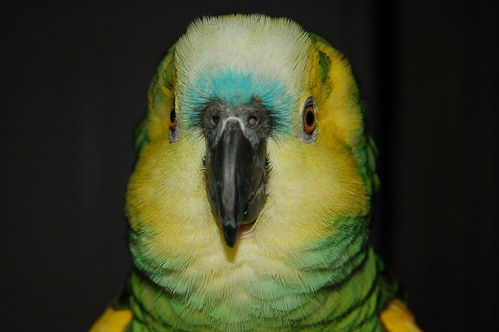
I really dislike the term “forever home”. It is used very commonly among people who take in rescued or re-homed parrots. “He has found his forever home”. I like the idea behind the expression, which is indicative of a person’s level of commitment to a bird that might be unsuitable in many homes. Practically speaking, all good intentions aside, it often doesn’t happen that way.
Have you ever given thought to what would become of your parrot if you were to die or in some way become incapacitated? What if you were faced with a financial crisis and were unable to keep your pets? Do you have a plan?
Both of my cockatoos could outlive me, as could my young Quaker, even if I live to a ripe old age. The cockatiels are getting up there in age, but who knows? I could be hit by a falling meteor on my way to the mailbox.
Placement:
Since parrots are so long-lived and require specific care, their placement is a little complex. If you are lucky enough to have a spouse that loves your birds like you do (not just tolerates them because he loves you), or children who have been raised around them and will commit to taking on their care once you are gone, you are indeed lucky.
Many people I have discussed this with do not feel that their family members will offer the same level of care and understanding that their birds are accustomed to. Sometimes your bird will be better off going into the care of an outside party that is educated about parrots and their needs.
Once you have made a decision on placement, it is a good idea to frequently reevaluate. Your favorite nephew may have eagerly offered to take over the care of your parrot, but his life could change as well. He may wind up engaged to a woman that really doesn’t care for birds and would prefer that one not be in her house. Once someone makes the offer, let them know that it is always retractable with no hard feelings. This will allow you to make other arrangements. NEVER will a bird to an unsuspecting relative or friend: so-and-so gets the house, so-and-so gets the jewelry, and so-and-so gets Kiwi because you once said he was cute. Not a good plan.

Passing along vital information:
On my computer desktop I keep two bird related files: Bird Instructions and My Parrots. I place them in the top center of the screen so they can be easily spotted. Bird Instructions outlines my daily routine for the feeding and care of my birds, should I ever be hospitalized or unable to return home for any reason. I include the number of my vet, and a few bird knowledgeable friends to call with any problems. I assume that someone with limited knowledge about birds might have the short term care of my birds, and I make it as simple as possible.
The My Parrots file contains a very detailed outline of each individual bird. It includes the hatch date, or approximate age if you don’t know for certain, and the species of each bird and whether captive bred or wild caught. It includes band #s, and microchip information, the number for the vet and a friend or relative who has had some experience with each parrot.
I specify, in length, any health or behavioral issues and list as many likes and dislikes as I can think of: foods, snacks, toys and favorite games. Also include a list of your bird’s quirks, he feels threatened if you… or doesn’t like his toes touched, for example.
I go into detail about how well this bird does with other birds, pets or children and how tolerant he is with commotion and noise. If you are working on any tricks with your bird, be sure to include those. A video of a training session would be helpful for a person who will continue this practice. It will give them a chance to see your training style and how your bird responds to it. I put in whatever I could think of that might help a future owner take the best possible care of my bird, and I constantly revise as new behaviors or issues present themselves.

Trust Funds:
Many people are setting up trust funds for the future care of their pets, should they die or find themselves unable to care for them any longer because of health issues or advancing age. We all know that keeping a parrot can be expensive. This will ensure that the new care giver will be able to afford the very best for your bird, and maintain the lifestyle he has grown accustomed to. A living will can ensure that your desires are carried out if you are unable to communicate them. Forms for this can be submitted online.
Mine are all going to a rescue in Arizona that is owned and operated by a dear friend. I trust her implicitly with the task of finding great new homes for my babies.
Author Patty Jourgensen specializes in avian health, behavior and nutrition and has been working with and caring for rescue birds since 1987.


8 comments
Leave a comment